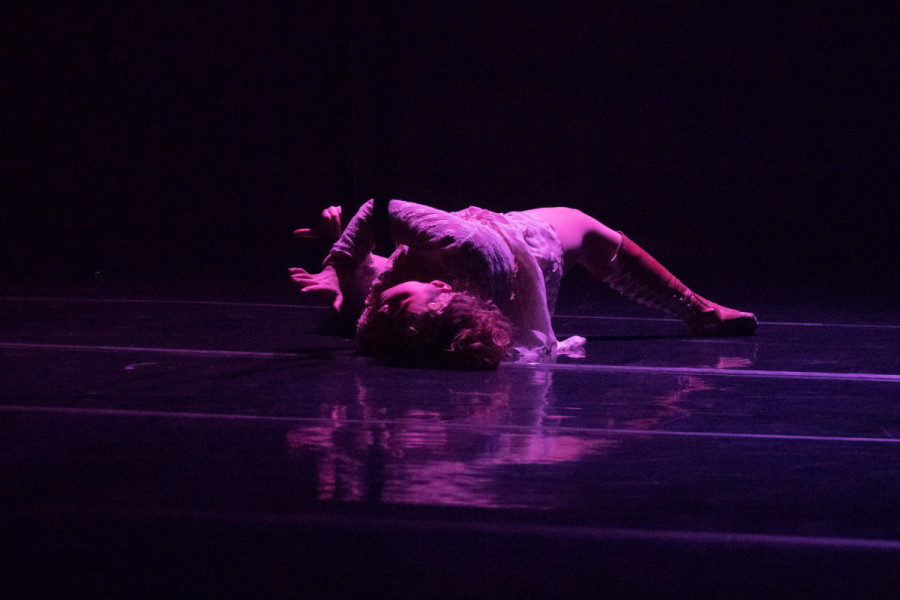The #MeToo Movement Lives on in ‘Persephone Bound’
Imago and Geordie Theatre Collaborate on Visually Striking Play
As spotlights sparked from behind the stage at the D.B. Clarke Theatre, Léda Davies floated, centre stage, two meters from the ground. Her legs swam through the air, her arms bound to thick black straps.
Persephone Bound, a co-production between the youth-oriented Geordie Theatre and Imago Theatre, in collaboration with Screaming Goats Collective, was created and conceived by Davies, a circus and theatre performance artist, who played Persephone, and actor Jed Tomlinson, who played Judge Justice.
In a time where the #MeToo movement is prevalent, pop culture continues to create works that handle sexual harassment with poise and care.
RelatedThe play is inspired by the Greek myth of Persephone and Hades, otherwise known as “The Rape of Persephone.” In the original Greek myth, Persephone is kidnapped by Hades, god of the underworld. He causes the ground to split beneath her, ensnaring her in his evil grasp.
In this modern day retelling, Persephone is a college student who was raped at a party by Hades.

On trial at the Court of Olympus, Persephone narrated the story of her rape before the judge, whose invasive questions and insensitive comments epitomized the judicial system’s treatment of rape cases in the real world.
What was she wearing? Had she been drinking? Had she any proof that the rape actually happened?
Forced to recount the worst day of her life, Persephone is sent spiralling through a series of different mental worlds.
From the college party where the rape occured, to the court scene, and an introverted space where Persephone drifted in the air, the narrative shifted through the three distinct realms like pieces from a jagged and traumatic memory.
Davies and Tomlinson, the creative minds behind Screaming Goats Collective, came up with the idea for the play before the #MeToo movement took the internet by storm in 2017.
On stage during the question and answer period, Tomlinson explained that the movement influenced the play.
“Clearly, this was a conversation that needed to be had, and clearly our society as a whole was waking up to that, and was fed up and done and ready to have that conversation,” said Tomlinson.
The #MeToo movement opened a conversation about sexual harassment, which is usually seen as private, he explained.
“The fact that it was becoming public gave us the opportunity to learn, to hear the stories, to bring as much as we could to this story, that would ring true,” he said.
The movement also helped unveil how the judicial system treats cases of sexual assault, which acts as the leading thematic trope of the play.
“Survivors are not seen as real, whole people in the judicial system. They’re seen as an event, or an accusation, but not as the whole person.” — Léda Davies
For example, every time Persephone stated her name, the judge interrupted with “irrelevant,” before continuing on to another set of belligerent questions.
“It takes Persephone’s identity away from her,” explained Davies.
“Survivors are not seen as real, whole people in the judicial system,” she explained. “They’re seen as an event, or an accusation, but not as the whole person.”
The narrative between Persephone and the judge came alive with the star quality of the play. There were beautifully choreographed aerial scenes that had Davies swinging against the dark stage, electronic music beating in the background.
She flipped and turned in the air, weaving herself in and out of black straps with finesse. Visually striking, the scenes are described as being “an internal space, where, queen-like, she builds a well-spring of courage and strength,” according to the blurb on Geordie Theatre’s website.
Davies explained that one of the reasons they decided to use aerial straps was because of their constricted and contorted nature that allowed to express that feeling in the show.

She said that she is used to ignoring the pain of training with aerial apparatuses, and that the discomfort of the aerial straps became an access point for further emotions.
“We started to explore what would happen if we actually leaned into the resistance of the apparatus,” she explained.
“And when we did that, we found a whole new vocabulary of movement on the aerial apparatus, but we also found that the movement had a deeper connection to a motivation within the body.”
One moment had Davies in a full split, the straps around both of her ankles. She executed each trick with precision.
Hades, or “the accused,” as the judge called him in the play, stood to the left of the stage, holding the straps and acting as Persephone’s spotter.
His character remained silent. He held onto her straps for the entirety of the show, keeping her bound, a poetic allusion to the rape.
Tomlinson addressed the character’s silence in the Q&A period.
“The guilt system is innocent until proven guilty,” he said. “It is not for Hades to defend himself. It is for Persephone to prove that it happened.”
“As an actor on stage, it was immediately clear to me that this position of silence was immeasurably powerful,” said Eric Nyland, who played Hades.
“Men hold power through silence,” he added.
At the end of the play, Persephone removed the straps from her arms. Davies described the moment as a call to arms.
“Although she will always have this impact of this trauma, is to acknowledge that it’s a part of her, but it doesn’t need to rule her,” said Davies.



